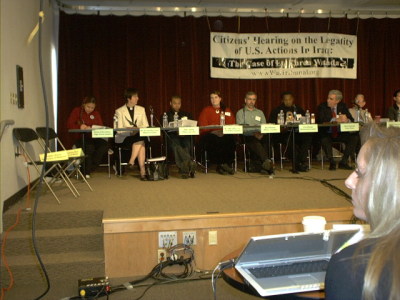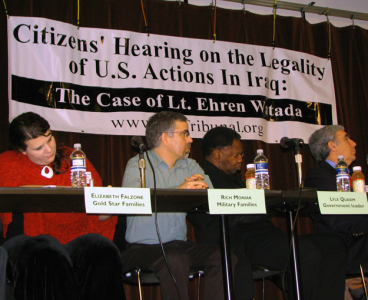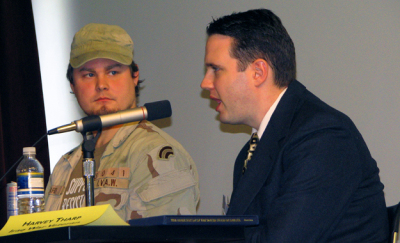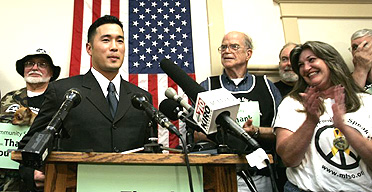Now Playing: Huffington Post Blog by Pauline Arrillaga
Deployed Troops Battle for Child Custody



Lt. Eva Crouch holds a 2004 photo of her daughter, Sara, at her home in Lawrenceburg, Ky., in this June 29, 2005, file photo. A member of the Kentucky National Guard, Crouch was deployed in 2003. Soon after her return, a judge would decide that Sara should stay with her dad. (AP Photo/Ed Reinke)
— She had raised her daughter for six years following the divorce, handled the shuttling to soccer practice and cheerleading, made sure schoolwork was done. Hardly a day went by when the two weren't together. Then Lt. Eva Crouch was mobilized with the Kentucky National Guard, and Sara went to stay with Dad.
A year and a half later, her assignment up, Crouch pulled into her driveway with one thing in mind _ bringing home the little girl who shared her smile and blue eyes. She dialed her ex and said she'd be there the next day to pick Sara up, but his response sent her reeling.
"Not without a court order you won't."
Within a month, a judge would decide that Sara should stay with her dad. It was, he said, in "the best interests of the child."
What happened? Crouch was the legal residential caretaker; this was only supposed to be temporary. What had changed? She wasn't a drug addict, or an alcoholic, or an abusive mother.
Her only misstep, it seems, was answering the call to serve her country.
Crouch and an unknown number of others among the 140,000-plus single parents in uniform fight a war on two fronts: For the nation they are sworn to defend, and for the children they are losing because of that duty.
A federal law called the Servicemembers Civil Relief Act is meant to protect them by staying civil court actions and administrative proceedings during military activation. They can't be evicted. Creditors can't seize their property. Civilian health benefits, if suspended during deployment, must be reinstated.
And yet service members' children can be _ and are being _ taken from them after they are deployed.
Some family court judges say that determining what's best for a child in a custody case is simply not comparable to deciding civil property disputes and the like; they have ruled that family law trumps the federal law protecting servicemembers. And so, in many cases when a soldier deploys, the ex-spouse seeks custody, and temporary changes become lasting.
Even some supporters of the federal law say it should be changed _ that soldiers should be assured that they can regain custody of children after they return.
"Now, they've got a great argument when Johnny comes marching home that the child should remain where they are, even though it was a temporary order," says Lt. Col. Steve Elliott, a judge advocate with the Oklahoma National Guard, referring to non-deployed parents.
Military mothers and fathers, meanwhile, speak of birthdays missed. Bonds, once strong, weakened. Returning from duty not to joyful reunions but to endless hearings.
They are people like Marine Cpl. Levi Bradley, helping to fight the insurgency in Fallujah, Iraq, at the same time he battles for custody of his son in a Kansas family court.
Like Sgt. Mike Grantham of the Iowa National Guard, whose two kids lived with him until he was mobilized to train troops after 9/11.
Like Army Reserve Capt. Brad Carlson, fighting for custody of his American-born children in a foreign land after his marriage crumbled while he was deployed to the Middle East and his European wife refused to return to the States.
And like Eva Crouch, who spent two years and some $25,000 pushing her case through the Kentucky courts.
"I'd have spent a million," she says. "My child was my life ... I go serve my country, and I come back and have to go through hell and high water."
In the midst of World War II, back in 1943, the U.S. Supreme Court held that the soldiers' relief law should be "liberally construed to protect those who have been obliged to drop their own affairs to take up the burdens of the nation."
Shielding soldiers, after all, would allow them "to devote their entire energy" to the nation's defense, as the law itself states.
But in child custody cases, the opposite often happens.
"The minute these guys are getting deployed, the other parent is going, `I can do whatever I want now,'" says Jean Ann Uvodich, an attorney who represented Bradley. "If you have an ex who wants to take advantage, they can and will. The obstacle is that the judge needs to respect the law."
Bradley had already joined the Marines, and his young wife, Amber, was a junior in high school when their son Tyler came along in September 2003. With Bradley in training, Amber and the baby lived with Bradley's mother, Starleen, in Ottawa, Kan.
When the marriage fell apart two years later, Bradley filed for divorce and Amber signed a parenting plan granting him sole custody of Tyler and agreeing that the boy would live with Starleen while Bradley was on duty.
In August 2005, Bradley deployed to Iraq. A month later, Amber sought to void the agreement and obtain residential custody of Tyler. She didn't fully understand what she had signed, she said later.
Bradley learned of the petition in Fallujah, after calling his mom's house one night to say hello to his son. He was infuriated.
He worked during the day as a mechanic with the 8th Communications Battalion, then headed back to the barracks and, because of the time difference, waited until midnight to call his mother to hear the latest from court.
"My mind wasn't where it was supposed to be," he says. And the distraction cost him. One day he rolled a Humvee he was test-driving. Though he wasn't injured, Bradley was reprimanded.
Uvodich sought a stay under the Servicemembers Civil Relief Act, which provides for a minimum 90-day delay in proceedings upon application by an active duty service member. She argued that Bradley had a right to be present to testify.
But the judge refused to postpone the case, saying he didn't believe it was subject to the federal law because "this Court has a continuing obligation to consider what's in the best interest of the child," court records show.
After a November 2005 hearing, the judge awarded temporary physical custody to Amber. Last summer, that order was made permanent.
Bradley, now 22, is stationed at Camp Lejeune, N.C., awaiting his second deployment to Iraq later this year. He gets to Kansas on leave for about two weeks every six months, and sees Tyler for four days at a time.
"I fought the best I could," he says. "The act states: Everything will be put on hold until I'm able to get back. It doesn't happen. I found out the hard way."
Oregon Circuit Court Judge Dale Koch, president of the National Council of Juvenile and Family Court Judges, said that as state court judges, those deciding custody cases are obligated to follow their family codes _ and "in most states there is language that says the primary interest is the best interest of the child."
"We recognize the competing interests," he says. "You don't want to penalize a parent because they've served their country. On the other hand ... you don't want to penalize the child."
But what does "best interest" really mean? Koch mentions factors such as stability and considering who has been the child's main emotional provider, parameters that conflict directly with military service. So how do you balance those things against upholding a deployed parent's civil rights? When, too, should a temporary change mean just that?
Iowa Guardsman Mike Grantham thought he was serving the best interests of his children when he arranged for his son and daughter to stay with his mother before reporting for duty in August 2002. She lived a few blocks from the kids' school in Clarksville, Iowa, and he figured, "There wouldn't be much disruption."
He had raised Brianna and Jeremy since his 2000 divorce, when ex-wife Tammara turned physical custody over to him.
After mobilizing, Grantham was served with a custody petition from Tammara, delivered to his unit's armory. His lawyer tried twice to request a stay under the federal law. His commanding officer even wrote a letter stating that Grantham's battalion was charged with protecting U.S. facilities deemed national security interests and that his case would cause the entire command structure "to refocus away from the military mission."
The trial judge nevertheless held hearings without Grantham and temporarily placed the children with Tammara. A year later, though Grantham had returned from duty, the judge made Tammara the primary physical custodian.
An appeals court later sided with Grantham, saying: "A soldier, who answered our Nation's call to defend, lost physical care of his children ... offending our intrinsic sense of right and wrong."
But the Iowa Supreme Court disagreed, saying Tammara was "presently the most effective parent."
Now, Grantham says, his visitation rights mirror those that his ex-wife once had: every other weekend, Wednesdays, and certain holidays _ Father's Day, for example.
"There ain't nothing you can do," he says. "Being deployed, you lose your armor."
Military and family law experts don't know how big the problem is, but 5.4 percent of active duty members _ more than 74,000 _ are single parents, the Department of Defense reports. More than 68,000 Guard and reserve members are also single parents.
Divorce among military men and women also has risen some in recent years, with more than 23,000 enlisted members and officers divorcing in 2005.
Army reservist Brad Carlson lived in Phoenix with his wife, Bianca, and three kids when he volunteered to deploy to Kuwait in 2003. His wife and children were spending that summer with her parents in Luxembourg and expected to remain there until he returned from duty.
A year later, after his wife indicated she wanted to end the marriage and remain in Luxembourg, Carlson filed for divorce in an Arizona court, seeking custody of Dirk, Sven and Phoebe, all American citizens.
The Arizona court dismissed the custody case after Bianca's lawyer argued that jurisdiction belonged in Luxembourg because the children had resided there for at least six months.
Again citing the Servicemembers Act, Carlson's attorney argued that the time the kids spent in Luxembourg shouldn't count toward residency because it came during Carlson's deployment.
A Luxembourg court awarded custody to Bianca, and the kids remain there to this day.
They call him "Bradley" now, he says, instead of "Daddy." They converse in German in stilted long-distance phone calls that provide few precious minutes for a father to absorb missed moments _ soccer games, kindergarten, birthdays. On Dirk's 9th, Carlson stood beneath a rainbow-colored birthday banner and had a friend take a digital photo of him holding a sign: "Happy 9th Birthday Dirk!"
Tears fill his eyes when it hits him: "That's how I celebrate."
"I feel really betrayed," Carlson says. "To be able to send me into harm's way ... and my own country can't protect my child custody rights. Why aren't they looking out for me, when I'm looking out for the country?"
The solution, some say, lies in amending the federal law to specify that it does apply in custody cases, and to spell out that jurisdiction should rest with the state where the child resided before a soldier deployed.
Some states aren't waiting for congressional action.
In 2005, California enacted a law saying a parent's absence due to military activation cannot be used to justify permanent changes in custody or visitation. Michigan and Kentucky followed suit, requiring that temporary changes made because of deployment revert back to the original agreement once deployment ends.
Similar legislation has been proposed in Arizona, Florida, Oklahoma, Texas and North Carolina.
"These men and women need to know that when we deploy them, they don't have to worry about being ambushed in our family law court system," says Michael Robinson, a lobbyist who helped write the California and Michigan laws. "The insurgents are doing enough ambushing over there. The only difference between what's occurring there and here is ... it's an emotional bomb."
Crouch knows that all too well.
When she was mobilized back in 2003, Crouch considered having her mother come live in her Frankfort, Ky., home to care for 9-year-old Sara. But her ex-husband, Charles, wanted Sara with him, and Crouch agreed.
"You have to promise me you won't try anything funny," Crouch told him.
He promised.
They drew up a temporary order, moved Sara's belongings 2 1/2 hours east to her dad's place near Ashland, and Crouch headed out _ to Iraq, she thought, although she wound up stateside at Fort Knox, providing personnel support to units shipping out.
The fortunate assignment allowed her to visit Sara most weekends, but no one ever brought up the idea of making the temporary situation permanent until Crouch returned.
"Right up until the day I came home there was every indication that I was picking her up," she says.
Charles Crouch says that's true, and acknowledges their agreement was supposed to be temporary. But when the time came for Sara to return to her mom, Charles says his daughter expressed a desire to stay with him. She liked her school, had made new friends.
"I had no intention of trying to talk her into staying or anything," he says. "All I wanted was what was best for my daughter."
Eva Crouch helped fight for the new Kentucky law. Last year, the state Supreme Court cited it in overturning the trial judge's decision granting custody to Charles.
Last September, she got Sara back.
Crouch knows she's one of the lucky few whose cases have happy endings. She's remarried now, and expecting another baby this August. But with 18 years in the military, she knows she could be mobilized again after she gives birth. One thing is clear to her now: Serving her country isn't worth losing her daughter.
"I can't leave my child again _ regardless of whether or not I know when I come home, she comes home.
"Still," she says, "I can't."








 (photo - on the Panel - Elizabeth Falzone - GSFSO/ MFSO - WA chapter and Rich Moniak - MFSO - Alaska chapter listen to two days of testimony)
(photo - on the Panel - Elizabeth Falzone - GSFSO/ MFSO - WA chapter and Rich Moniak - MFSO - Alaska chapter listen to two days of testimony)


 (photo - Stacy Bannerma, wife of returning Iraq veteran - WA Natl Guard, gives testimony)
(photo - Stacy Bannerma, wife of returning Iraq veteran - WA Natl Guard, gives testimony)

 (photo Lietta Ruger, MFSO- WA, in support Lt. Ehren Watada, June 2006, Tacoma, WA)
(photo Lietta Ruger, MFSO- WA, in support Lt. Ehren Watada, June 2006, Tacoma, WA)
 (photo - Lietta Ruger, Judy Linehan, Jenny Keesey - from MFSO - WA chapter, June 2006, Tacoma, WA)
(photo - Lietta Ruger, Judy Linehan, Jenny Keesey - from MFSO - WA chapter, June 2006, Tacoma, WA) (photo - Judy Linehan, MFSO - WA at support rally for Lt. Watada, June 2006, Tacoma, WA)
(photo - Judy Linehan, MFSO - WA at support rally for Lt. Watada, June 2006, Tacoma, WA)






 photo - Sue Niederer, MFSO. Her son U.S. Army 2nd Lt.Seth Dvorin, 24 yrs old was killed in Iraq Feb 3, 2004.
photo - Sue Niederer, MFSO. Her son U.S. Army 2nd Lt.Seth Dvorin, 24 yrs old was killed in Iraq Feb 3, 2004. photo - Nancy Lessin, MFSO Co-Founder
photo - Nancy Lessin, MFSO Co-Founder  photo - Lietta Ruger, MFSO - WA
photo - Lietta Ruger, MFSO - WA  photo - Stacy Bannerman, MFSO - WA
photo - Stacy Bannerman, MFSO - WA



